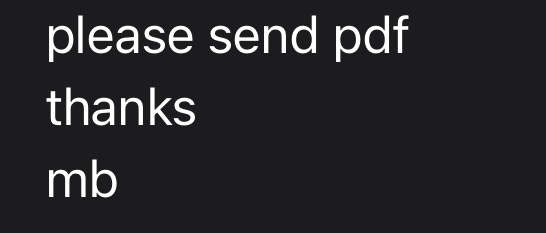How to Get a Manuscript Request from a Literary Agent
Journey to Publication - Week 7
Six agents are currently reading my novel THE LILAC ROOM. I began querying seven weeks back, and since then, I have successfully convinced six agents that my manuscript is worth reading. Given that I received zero manuscript requests last year when querying my previous novel, MAN A MUSEUM, I am pleased with progress thus far and hope that at least one of these six agents will find something of value in the text (and something that will translate to monetary value as well, since that is, of course, what they are after). While I wait on an offer of representation, I wanted to share some of my thoughts about how I reached this stage of the querying process called the manuscript request.
What Is a Manuscript Request?
The sad reality of the publishing world is that completing a novel is only the first step of the arduous journey to publication—and, arguably, the easiest (though you should be incredibly proud regardless that you’ve written an entire novel—that is, of course, no small feat). Once you’ve written your novel, you’ll move on to the next more difficult step of putting together your query package (I discuss how to do that in depth here), and once your query package is ready, congratulations! You’ve completed another relatively easy step of the publishing process. The hard part is getting your manuscript read.
Agents will request to read your manuscript through a manuscript request. I call this “the hard part” because once you’ve perfected your query package, an agent’s subjective opinion of your work is entirely out of your control. According to data from QueryTracker, the average manuscript request rate from an agent is between 0.03% and 1.1%. This is a generous estimate because more people are likely to report successful manuscript requests over rejections. I am guilty of this myself—I have now reached the milestone of 28 rejections, so it would take far too long to manually document all of them. I do, however, report manuscript requests because they are so far and few in between that they are easy to note down. I suspect that many writers operate in this way, so you can bet that that 0.03% to 1.1% stat is even lower in reality. At this rate, an author would need to query about 333 agents before securing a single manuscript request—and most genres don’t even have 300 agents. So how is it possible to secure a manuscript request?
Well, if your query letter is polished, the number is much higher. Agents will parse through lots of slush (unsolicited queries are called “slush piles” in the literary agent world—oh, the useless information I’ve acquired throughout this process), and most queries will not be very good. Therefore, if you’ve written a good query, you can expect the manuscript request rate to be much higher—about 5% is the number I am seeing for a strong query. I’ve now queried 92 agents and received six manuscript requests, which puts me at 6.5%, so I am happy with this stat.
The fact is that most writers will query 50, 100, 150, or even 200 agents without ever receiving a manuscript request. This happened to me with my previous novel, MAN A MUSEUM, which I hope to serialize on here soon—though I only queried 68 agents before deciding to retire the project—so I feel immensely grateful that several agents have written back to me about THE LILAC ROOM with their manuscript requests.
So what is a manuscript request? Once an agent has read through your query package, they will either decide to reject you, ignore you (this is the most common one—most agents don’t even bother responding), or read your book. Most books these days are 200-300 pages long, so most agents will be hyper-selective about what they devote their time to—they’re not getting paid for reading your book, after all. Manuscript requests can go either way in terms of offers—either an agent will feel they can sell your book effectively and will sign you on (I hope to God that this is the case with the agents currently reading THE LILAC ROOM) or they will not resonate with your book after reading it (or decide there are not enough trans characters) and deal you that same old rejection. I’ve seen the odds of receiving an offer after a manuscript request reported to be between 5% and 40%, so it is difficult to predict the outcome, but either way, the fact that an agent requested the manuscript means that they are interested in the subject matter, which should substantially boost the odds that they will sign you on. Data from the Internet (unlike many fiction writers, I like data) suggests that novelists with about 5-10 requests are very likely to close a book deal, so I’m keeping my fingers crossed that I’ll sign with an agent soon given that I have now approached the golden number.
Partial Manuscript Requests
While the odds of signing with an agent after a full manuscript request are promising, the odds are slightly lower for a partial manuscript request (between 5% and 10%) but can still lead to that coveted book deal. In contrast to a full manuscript request, which suggests that the agent is very interested in your work, a partial manuscript request (usually about 50 pages) indicates that an agent might want to first test the waters with your work before committing to the entire thing. Partial manuscripts are a great way to give an agent a preview of your book and to reel them in to read further. Though partial manuscript requests have a smaller conversion rate into book deals, they are still great opportunities to get your agent hooked if your sample 50 pages are strong enough.
Whether you’ve gotten a full or partial manuscript request, however, you should pat yourself on the back—these requests are rare (you’re in the 1% club) and indicate an agent’s serious interest in your work.
Journey to Publication - Week 7 Updates
We received another three manuscript requests this week (yay!). The first was from an agent who solely seemed interested in my project because I went to Columbia. Seriously. He says he doesn't even do fiction these days.
Now I know why I paid for my Columbia degree, at least. This response is also telling—he seems less interested in the subject matter and more interested in my educational background, which is perhaps a giveaway that my novel will be more “sellable.”
The literary world continues to disappoint.
The second manuscript request was short—just the first twenty pages—but the agent responded within several hours and seems like a fantastic fit. Shout-out to Martin Driver for suggesting a slight tweak in the novel pitch that seems to have reeled this agent in.
The third agent sent this cryptic email in response to my query:
I am going to assume that this is a manuscript request. If it is not, oh well.
In other news, we’re up to 28 rejections as of this week. That’s okay—we still have about 50 open queries and another 15 or so that were sent out this week. The success rate is hovering at 5%, and some other agents that we queried this past week seem promising.
One agent felt that my novel was too “commercial,” which is hilarious to me because I thought the issue was that my novel was too “literary” and therefore spruced the query letter up to read more “commercial.” You can really never win.
Here comes the query counter.
Query Counter - Week 7
Query Rejections: 28
Manuscript Requests: 6
Total Queries: 92
See you next week!






I’ve been going through this process for a piece of hard science fiction I’ve written as well. Into the low dozens for submissions to no avail, but I recognize that I still need to multiply that by 10x.
I also need to rewrite and expand, so I’m not feeling like it is totally polished either.
I have gotten some kind responses from several agents, but no takers or manuscript requests to date.
Thanks for the shout out and the opportunity to help. I'm looking forward to your sharing some of MAN A MUSEUM!